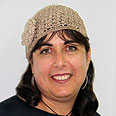
Poll: 83% of haredim suffer ethnic discrimination
While most respondents say they have not experienced phenomenon, majority of haredi sector say they, or someone they know, were subject to discrimination. Survey also reveals half of Israelis give State failing grade on 'acceptance of others'
The legal drama around Beit Yaacov School in Emanuel stirred up the haredi street, but they are not the only ones that consider ethnic background as an important educational factor – A joint survey by Ynet and Yesodot Center for Torah and Democracy shows that half of the haredi community considers ethnic, as well as economic and religious backgrounds, the main factors influencing their decision on where to send their kids to school.
The survey was conducted by the Panels research institute and included 501 respondents – a national sample representing the mature population in large Jewish communities in Israel. The maximal sampling error was ±4.4%.
On the question of "how would you select an educational institution for your children", 76% of respondents said they consider the quality of the faculty and administration most important, while 14% said they would make sure that the students at the institution hail from different backgrounds and origins. Another 10% noted that the students' ethnic, economic and religious backgrounds being the same as their children's was at the top priority.
According to religious affiliation, 83% of secular, 71% of traditional and 64% of religious respondents placed the quality of the staff and curriculum at the top of the list, while 50% of haredi respondents said the background of other students was the most important factor.
In the second part of the survey, the participants were asked whether they, or anyone they know, have been victims of ethnic discrimination when applying their children to an educational institution. Fifty five percent of respondents replied negatively, 34% said they knew someone who was subject to discrimination and 11% testified of having experienced such discrimination themselves.
The survey analysis found that 63% of seculars said they have not experienced discrimination, while 51% of traditional, 59% religious and 83% haredi respondents were exposed to it either personally or through an acquaintance.
The participants were also asked to grade the State of Israel on "acceptance of the other" on a scale of 1 to 10.
Almost half of the respondents (48%) gave the State a failing grade of 1-4, while a large number (44%) scored it between 5-7. only 7% gave a score between 8 and 10, and the rest chose not to respond. In total, the State received an average score of 4.5.
On the question of immigration absorption, the State scored slightly higher, with an average grade of 5.1.
'Sad picture'
Yesodot Educational Director Shoshi Becker said the survey "revealed a sad picture that was already known from the media: Discrimination based on ethnic background is much more common in the religious community than among seculars – and is especially prevalent among the haredim," she said."About a fifth of religious people oppose integration, while in the haredi community the number is much higher at about a half."
According to Becker, the situation is absurd because those who are discriminated by society for being different – do not respect others who are different than them.
This phenomenon, Becker noted, contradicts the passage, "And you are to love those who are aliens, for you yourselves were aliens in Egypt" (Deuteronomy 10:19), and therefore she called for self-examination ahead of the Shavuot holiday.
Becker suggested appointing a public body that will examine whether the screening process in several educational institutions involves overt or covert ethnic biases.
"A Jewish state that is based on values of equality cannot remain indifferent to such trends," she said, adding that "the biggest challenge for the religious community particularly and the Israeli society in general, is to know how to accept the other – both in educational institutions and in society – with the duty of preserving the values held by each and every group."










